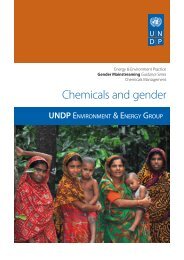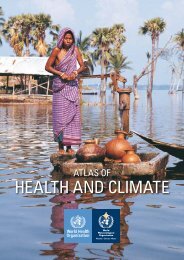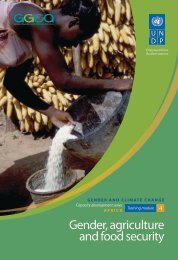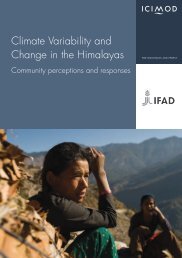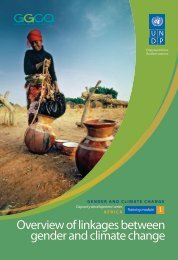jotoafrika - Gender Climate
jotoafrika - Gender Climate
jotoafrika - Gender Climate
Create successful ePaper yourself
Turn your PDF publications into a flip-book with our unique Google optimized e-Paper software.
Workshop participants performing a role play to express<br />
gender relations with respect to climate change, South Africa<br />
© Indigo Development & Change, 2010<br />
<strong>Climate</strong> change can exacerbate<br />
inequalities. Because of their position<br />
in many societies, women tend to be<br />
more vulnerable to climate variability<br />
and change, and often experience larger<br />
negative impacts than men. Adaptation<br />
strategies should not consolidate or<br />
extend these inequalities.<br />
One way to ensure this is to enable women’s<br />
participation in all learning and decisionmaking<br />
related to climate adaptation, at all<br />
levels. But including women in a meaningful<br />
way is not easy. Women tend to provide<br />
the continuity in society; they stay at home<br />
to attend to children, and elderly and ill<br />
relatives. There may be livestock to attend<br />
to and food to prepare. In contrast, men are<br />
usually more mobile and often have more<br />
wide-ranging networks.<br />
<strong>Climate</strong> change preparedness<br />
For the past six years, Indigo Development<br />
& Change, a South African nongovernmental<br />
organisation, has facilitated<br />
climate change preparedness workshops<br />
every three months in the Suid Bokkeveld, a<br />
remote, semi-arid area in South Africa.<br />
The workshops were triggered by a very<br />
severe drought that lasted three years, and<br />
have evolved from a small group of mostly<br />
male farmers into rich quarterly community<br />
gatherings. Topics discussed include<br />
seasonal weather forecasts, results from<br />
farmers’ climate dairies, and strategies to deal<br />
with extreme climatic conditions and climate<br />
variability.<br />
Page 2<br />
Including women<br />
in adaptation<br />
processes<br />
Case study<br />
Facilitators planned carefully to ensure<br />
spaces to allow women and men full<br />
participation in the workshops. However,<br />
only a few women attended the first<br />
workshop and several brought their children<br />
with them. The children’s needs took the<br />
women’s focus off the workshop content, as<br />
did their attention to catering.<br />
At the women’s suggestion, the children<br />
were invited to engage in their own<br />
activities, run by two facilitators. The<br />
children enjoyed this and it has become<br />
a regular feature. The report from the<br />
children’s workshop is a highlight of each<br />
workshop! Catering is now provided by<br />
community members not engaged in<br />
farming. Furthermore, a bus collects all<br />
participants at convenient pick-up points, so<br />
everyone is equally mobile.<br />
The workshops provide an invaluable<br />
opportunity to understand the perspectives<br />
of women farmers in the area. They create<br />
a space for joint learning and reflection in<br />
the community, where men and women<br />
can share their experiences, collect<br />
information from small-scale experiments<br />
and climate monitoring, and plan strategies<br />
in anticipation of climate variability.<br />
Men and women propose small adaptation<br />
projects on their farms at workshops as<br />
well. This is a great confidence booster<br />
for some women, who report back on<br />
successes and challenges encountered.<br />
The equal access of men and women to<br />
funding for adaptation projects is important<br />
and supports an approach that includes<br />
the entire community and draws on the<br />
strengths of its members.<br />
Join the AfricaAdapt network<br />
These changes to the workshops have had<br />
several positive impacts:<br />
The children’s workshops and catering<br />
provided allow both female and male<br />
farmers to focus on the workshop<br />
content while having their needs, such<br />
as food and child care, attended to.<br />
The workshops perform an important<br />
social function and provide a safe<br />
space for interaction and sharing<br />
among women, who are often isolated<br />
on their farms.<br />
Women who want to play a larger role<br />
and be involved in the farmers’<br />
co-operative have been able to<br />
establish themselves as voices of<br />
authority.<br />
Women can enjoy the process of<br />
building self-confidence and having<br />
their contributions taken seriously<br />
in an engaging and enthusiastic<br />
environment.<br />
Wendy Annecke and Bettina Koelle<br />
Indigo Development & Change<br />
P.O. Box 154, Nieuwoudtville 8180, South<br />
Africa<br />
Tel +27 27 2181148<br />
bettina@indigo-dc.org<br />
See also<br />
<strong>Gender</strong> and <strong>Climate</strong> Change Adaptation,<br />
by Wendy Annecke, Indigo Development<br />
& Change, South Africa, 2010<br />
http://bit.ly/fQvpGV<br />
AfricaAdapt is an independent network in French and English, focused exclusively<br />
on Africa. The aim is to facilitate the flow of climate change adaptation knowledge<br />
for sustainable livelihoods between researchers, policymakers, civil society<br />
organisations and communities who are vulnerable to climate variability and<br />
change across the continent.<br />
www.africa-adapt.net<br />
info@africa-adapt.net



